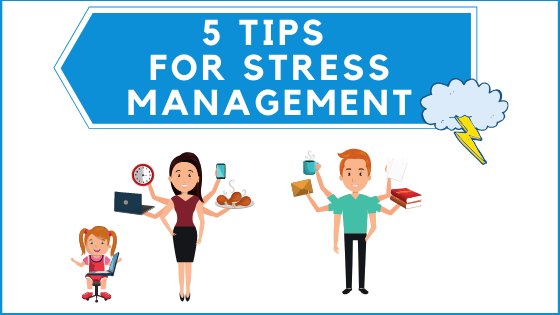We all have stress, whether at work, at home, with family or with friends. Sometimes specific things or circumstances can make us feel especially stressed out. Stress is a very normal part of life but the most important thing is how we respond to and manage our stress. So the next time that you are feeling stressed, try these 5 techniques for managing it.
- Exercise regularly
Brisk movement can help improve sleep and combat stress. Research shows that individuals who participated in moderate physical activity had half the perceived stress as those who did not participate. Physical activity may also cancel out some of the negative effects of stress, including the impact of stress on the immune system. Exercise causes the release of endorphins, so adding physical activity into your routine will also make you happier.
2. Practice parasympathetic activities such as mediation
Multiple studies have found that mindful meditation can reduce psychological stress and anxiety. Here’s how to do it, just take five minutes to yourself in a quiet place to sit and breathe. Focus on the present moment. Don’t worry if your mind starts to wander to other thoughts. Simply acknowledge those thoughts and then let them go. Refocus and bring your attention back to the present moment.
3. Get adequate sleep
Stress during the day affects the quality of our sleep at night. Even worse, insufficient sleep can affect both brain function and mood. Limit electronic device usage like smartphones and computers in the evening. Don’t consume caffeine late in the day (after 3 or 4 pm). Try to get in the habit of waking up and going to bed at consistent times to ensure adequate nightly sleep. Finally, get moving during the day! Research suggests that physical activity can improve sleep and combat stress.
4. Eat a high quality whole foods based diet
When we are stressed our central nervous system releases cortisol. Research has shown that high cortisol levels combined with high sugar consumption may cause fat to be deposited around our internal organs. This is called visceral fat and it is associated with cardiovascular and metabolic diseases. Choose high quality whole foods which will provide you with a variety of nutrients and health benefits. Aim to consume a diet full of colorful fruits and veggies daily!
5. Transform negative thoughts
Our thoughts influence our emotions, and our emotions influence our behaviors. Reframing your thoughts around the causes of stress can help you better control your emotions, which help reduce perceived stress. Redirect negative energy and thoughts into positive ones. Evaluate your expectations and learn to accept the situations that are outside of your control.
Ashley Osterman
Director of Nutrition Education
Healthy Steps Nutrition
www.growyournutritionbusiness.com

LEARN MORE ABOUT NUTRITION COACHING WITH HSN
Research References:
Aldana, S. G., Sutton, L. D., Jacobson, B. H., & Quirk, M. G. (1996). Relationships between Leisure Time Physical Activity and Perceived Stress. Perceptual and Motor Skills, 82(1), 315–321. doi: 10.2466/pms.1996.82.1.315
Fleshner, F. (2005). Physical Activity and Stress Resistance: Sympathetic Nervous System Adaptations Prevent Stress-Induced Immunosuppression. Exercise and Sport Sciences Reviews, 33(3), 120–126. doi: 10.1097/00003677-200507000-00004
Goyal M, Singh S, Sibinga EMS, et al (2014). Meditation Programs for Psychological Stress and Well-being: A Systematic Review and Meta-analysis. JAMA Intern Med.174(3):357–368. doi:10.1001/jamainternmed.2013.13018
Åkerstedt, T., Kecklund, G., & Axelsson, J. (2007). Impaired sleep after bedtime stress and worries. Biological Psychology, 76(3), 170–173. doi: 10.1016/j.biopsycho.2007.07.010.
Black, D. S., O’Reilly, G. A., Olmstead, R., Breen, E. C., & Irwin, M. R. (2015). Mindfulness meditation and improvement in sleep quality and daytime impairment among older adults with sleep disturbances: a randomized clinical trial. JAMA internal medicine, 175(4), 494–501. doi:10.1001/jamainternmed.2014.8081
Dolezal, B. A., Neufeld, E. V., Boland, D. M., Martin, J. L., & Cooper, C. B. (2017). Interrelationship between Sleep and Exercise: A Systematic Review Advances in preventive medicine, 2017, 1364387. doi:10.1155/2017/1364387
Gyllenhammer, L. E., Weigensberg, M. J., Spruijt-Metz, D., Allayee, H., Goran, M. I., & Davis, J. N. (2014). Modifying influence of dietary sugar in the relationship between cortisol and visceral adipose tissue in minority youth. Obesity (Silver Spring, Md.), 22(2), 474–481. doi:10.1002/oby.20594.
Hofmann, S. G., Asnaani, A., Vonk, I. J., Sawyer, A. T., & Fang, A. (2012). The Efficacy of Cognitive Behavioral Therapy: A Review of Meta-analyses. Cognitive therapy and research, 36(5), 427–440. doi:10.1007/s10608-012-9476-1






